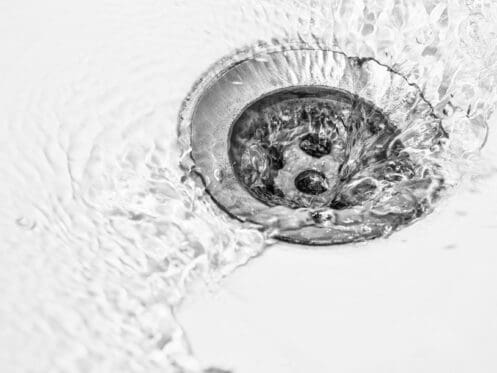Summer is famous for warm-weather activities, backyard gatherings, beach trips, and family vacations. The sunshine and warm weather can offer the perfect opportunity to create unforgettable memories. However, the last memories that any homeowner wants to create during the summer are plumbing catastrophes. Here is some guidance to safeguard your plumbing system.
Clogged Drains
Many people spend summer months participating in outdoor activities like taking trips to the beach, hiking up mountains, or fishing outings. However, when it is time to wash your hands or shower after these activities, the remnants of the fun can end up in your drains. For example, sand, dirt, or mud can cause major drain clogs and blockages. Sunscreen, soap scum, and hair can also create buildup that obstructs pipes and drains.
A preventive step is to take advantage of public showers after a trip to the beach to wash away sand, sunblock, and debris. After a hiking, mountain biking, or fishing excursion, use your garden hose to clean off the worst of the dirt and mud rather than heading straight for your shower. By being proactive and mindful of what enters your drains, you can enjoy your summer activities without worrying about the consequences on your home’s plumbing.
Blocked Toilets
Summer usually means vacation from school as well as the increased likelihood of visits from friends, family members, and other guests. The increased number of household occupants means that your toilets are used far more often than at other times of the year. According to the Environmental Protection Agency (EPA), the average person flushes the toilet at least five times daily. Higher use of toilets can boost the odds of something going wrong. To minimize the risk, remember to never flush items like baby wipes or feminine hygiene products. If you notice persistent clogs or negative signs like cracks or leakage, reach out to a professional before the issue escalates into a more costly repair.
Outdoor Plumbing Fixtures
Hot summer weather means using outdoor spigots more often to keep your lawn healthy, hydrated, and green. However, spigots and other outdoor plumbing fixtures can result in considerable water wastage. According to the EPA, a leaky faucet that trickles at one drip per second can waste over 250 gallons of water in a month. Always check spigots periodically to ensure they fully turn off when you are done using them. A plumber can fix or replace faulty fixtures if there is an issue contributing to higher water bills.
In addition to paying attention to fixtures, check garden hoses for any cracks, leaks, or worn-out areas and replace them as needed. Most hoses purchased for residential use should be replaced every three to five years. Ensure that hose connections are secure, and use washers or Teflon tape to prevent leaks at the joints. Additionally, consider upgrading to more efficient sprinklers, such as those with adjustable spray patterns or moisture sensors, which can reduce water usage by targeting only the areas that need it. Smart irrigation controllers can also help by adjusting watering schedules based on weather conditions and soil moisture levels. By staying proactive with your hoses and sprinklers, you can conserve water and reduce utility costs while keeping your lawn in good condition.
Leaky Indoor Faucets
While leaks can occur during any time of the year, they can turn into a particular nuisance during the summer. Factors like extreme heat can contract and expand metal pipes and fixtures. Old or worn-out faucets or gaskets can also create problems since you are already using more water during the summer. Even the smallest leaks in faucets can cause a significant increase in water bills. Leaks under the sinks in your kitchen or bathroom can also cause water damage to your home and contribute to mold growth. Contacting a plumber to fix leaks before these issues get out of hand is essential.
Sewer Line Backups
Summer weather conditions can increase the risk of sewer line backups, posing significant issues for homeowners. Drastic temperature changes and heavy rainstorms can cause underground soil to shift, leading to the contraction or expansion of the soil that can crack or break older pipes. Even the smallest cracks can allow soil into your sewer line, eventually creating sewage backups. Additionally, the warm weather heightens the risk of tree root intrusion. During the summer, growing roots stretch toward pipes in search of moisture and nutrients, potentially leading to severe sewer or septic problems if undetected. To prevent these issues, call a local plumber at the first sign of wastewater problems, such as foul odors emanating from your lawn. An expert can determine whether you need sewer line repair, rooter services, or other plumbing solutions, ensuring your home’s drainage system remains in optimal condition.
Garbage Disposal Breakdowns
Many homeowners use their garbage disposals more frequently during the summer. Activities such as grilling or outdoor dining can increase the amount of food waste containing items that can jam or clog a garbage disposal unit. To stay on the safe side, avoid putting common summer items like corn cobs, rib bones, or melon rinds into the garbage disposal. Also, watch out for the seeds or pits of fruits like peaches and apricots. Other items that you should avoid putting into the garbage disposal include corn husks, oyster shells, or oils and drippings from meats. If you find that your garbage disposal has stopped working, a plumber can troubleshoot to determine whether it needs repair or replacement.
Flooded Basement
Summertime is notorious for sudden flash storms, which can put your basement at risk of flooding if your sump pump is defective. A small malfunction can lead to significant water damage during an unexpected downpour. To prevent your basement from becoming a flood zone, have a professional test your sump pump during annual plumbing inspections. Regular maintenance ensures your sump pump is in good working order, providing peace of mind and protecting your home from costly water damage.
Water Heater Breakdowns
Extensive summer activities can significantly increase the demand for hot water, whether for showering after outdoor fun or washing the family vehicle. The last thing you want is a faulty water heater disrupting your routine. Common signs of water heater problems include insufficient hot water or water that takes longer than usual to heat up. Another indicator is unusual noises coming from the water heater, which could indicate sediment buildup or other internal issues. A professional can test your water heater during annual plumbing inspections or troubleshoot the problem if immediate repairs are needed.
Contact the Pros
At First Choice Plumbing, Heating & Air Conditioning, we have been serving the residents of Metuchen, NJ and the surrounding areas for over twenty years. We install, repair, and maintain heating and cooling systems. In addition, we are expert plumbers who can repair or replace indoor and outdoor faucets and deal with any sewer or sump pump issues. We also offer water treatment services to improve the quality of your family’s drinking water. Contact First Choice Plumbing, Heating & Air Conditioning today to schedule an appointment with one of our experienced team members.



